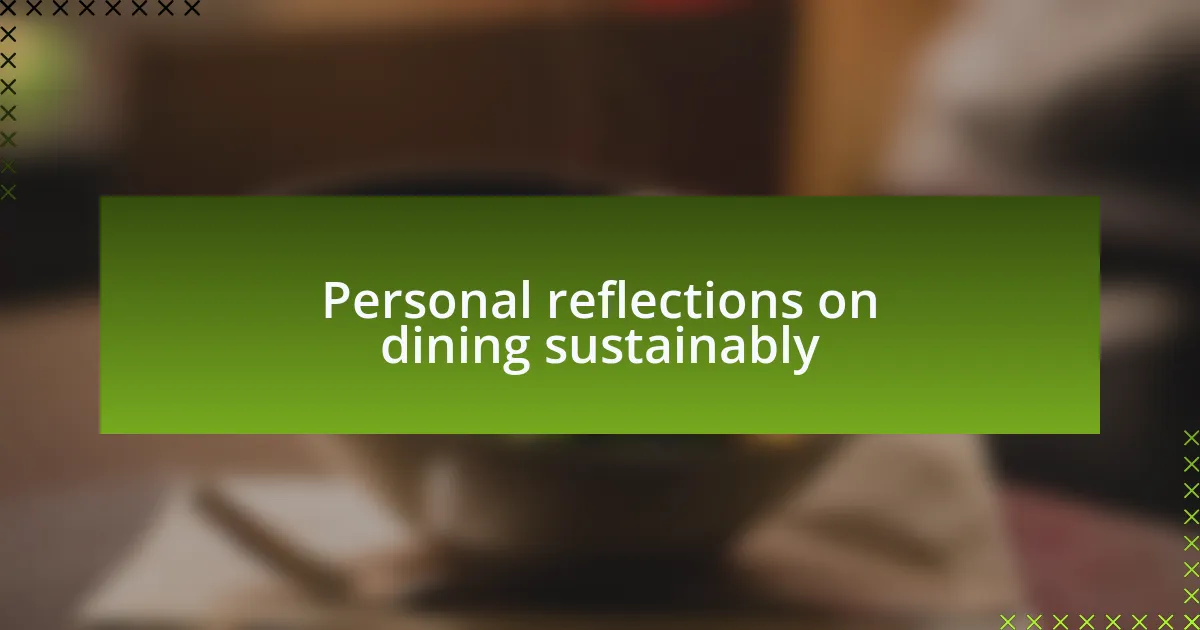Key takeaways:
- Food sustainability enhances culinary experiences by connecting diners with local sourcing and seasonal ingredients, elevating flavors and appreciation for the food journey.
- Minimizing food waste in fine dining not only protects the environment but also fosters creativity in cooking, showcasing the artistry in sustainable practices.
- Ethical choices in meat and seafood sourcing can deepen the connection to nature and enhance the quality of meals, promoting health and environmental sustainability.
- Seasonal menus and local sourcing foster community connections and a greater appreciation for the cycles of nature, enriching the dining experience.

Understanding food sustainability
Food sustainability is more than just a trend; it reflects a growing awareness of our impact on the environment. I remember the first time I visited a farm-to-table restaurant—seeing the vibrant produce and learning about the local sources sparked a realization about the journey our food makes before it reaches our plates. Isn’t it incredible how our dining choices can support local economies and reduce carbon footprints?
When we discuss food sustainability, it’s essential to consider not just the ingredients but also the dining experience. Have you ever thought about how much food is wasted in fine dining? Experiencing a meal where every part of the ingredient is used creatively left a lasting impression on me. It highlighted that sustainability can elevate flavors and innovation in ways I hadn’t previously considered.
Engaging with sustainable practices often requires us to rethink our relationship with food. For instance, I’ve found that incorporating seasonal ingredients into my meals not only enhances taste but also fosters a deeper connection to nature and the cycles of life. How can we, as diners, embrace this approach to contribute to a more sustainable future while enjoying exquisite culinary experiences?

Importance of sustainable practices
Sustainable practices in fine dining are crucial, as they not only help protect our planet but also enhance the overall dining experience. I recall dining at a restaurant that showcased a seasonal tasting menu. Each dish told a story about the farmers and producers, making me appreciate where my food came from. Isn’t it fascinating how understanding the source of our ingredients can transform a meal into a meaningful experience?
One key element of sustainable practices is minimizing food waste, which often goes unnoticed in fine dining. I once witnessed a chef creatively repurposing vegetable scraps into an elegant broth. The experience made me realize that sustainability is not just a responsibility—it can lead to culinary artistry. Have you ever considered how these innovative tactics can inspire chefs and elevate our dining encounters?
Moreover, choosing sustainable practices can foster trust and loyalty between restaurants and their patrons. When I learned that a local bistro sourced its seafood from responsible fisheries, I felt more inclined to support them. Isn’t it refreshing to know that our food choices can send a message about what we value? Emphasizing sustainability in dining is vital for cultivating a shared commitment to protecting our environment while indulging in exquisite flavors.

Fine dining and sustainability
Fine dining and sustainability are more intertwined than many realize. I remember visiting a Michelin-starred restaurant that proudly displayed its commitment to local sourcing in its open kitchen. Watching the chefs prepare dishes with ingredients fresh from nearby farms showcased not just a meal but a deep connection to the community. Doesn’t it make you feel good to support local producers while indulging in high-quality cuisine?
Sustainable fine dining can also involve thoughtful menu design, which I’ve seen firsthand at various gourmet establishments. One evening, I dined at a place where the chef crafted a menu based entirely on plants, elevating humble vegetables to star status. It struck me how embracing plant-based options not only reduces the carbon footprint but also showcases creativity in cuisine. Have you tried a dish that surprised you with its depth and flavor despite having no meat at all?
Additionally, fine dining often sets trends that can influence broader dining culture. At a recent restaurant where a portion of their profits supported environmental charities, I felt an overwhelming sense of purpose with each course. It made me ponder—how powerful is it when a dining experience goes beyond just eating and instead contributes to a cause? The conversation around fine dining and sustainability is not just necessary; it’s an opportunity to redefine what indulgence can look like in today’s world.

Sourcing local ingredients
When it comes to sourcing local ingredients, I cherish the moments I’ve spent at farms connecting directly with the producers. There’s something heartwarming about seeing where the food comes from, feeling the earthiness of freshly picked vegetables, and forging a bond with the people behind our meals. This connection often translates into vibrant flavors on the plate—as if the land and the chef have collaborated in every bite.
I recall a breathtaking dinner where the chef introduced each course by highlighting the local farms that supplied the ingredients. It was more than just a meal; it felt like a story woven together by the community. I couldn’t help but wonder, how often do we consider the journey of our food? This experience deepened my appreciation for the meticulous care and craftsmanship that local farmers pour into their produce.
Moreover, while enjoying a dish made with locally sourced grains, I was struck by how these ingredients not only support sustainability but also enhance the dining experience. It’s incredible how flavors can resonate differently when you know they’re harvested a stone’s throw away. What if every fine dining experience prioritized this intimacy with local sourcing? The potential to create meals that celebrate a region’s unique identity is boundless.

Seasonal menus and their benefits
H2: Seasonal Menus and Their Benefits
There’s something magical about seasonal menus that truly captivates me. I recall dining at a restaurant that changed its menu with the seasons, and each dish felt like a celebration of that specific time of year. The flavors were fresher and more vibrant, transporting me right to the height of harvest time; I could almost taste the sunshine captured in every ripe tomato. How often do we stop to appreciate that the best ingredients are at their peak in specific seasons?
When chefs highlight seasonal ingredients, they not only embrace flavor but also emphasize sustainability. I remember savoring a dish featuring asparagus in spring; it was tender, crisp, and bursting with earthy notes. The experience reminded me of why it’s essential to align our culinary choices with nature’s calendar. Seasonal menus invite a sense of urgency and excitement—why rush to consume out-of-season produce when the finest bites await us just a few months down the line?
What resonates with me the most is the sense of community that seasonal dining fosters. During a fall dinner highlighted by squash and hearty grains, I felt an intimate connection with the land and its bounty. Each course was a reminder of how food is not just sustenance but a reflection of the cycles of nature. This relationship prompts the question: In what ways can we deepen our appreciation for the seasons that offer us such culinary gifts?

Ethical meat and seafood choices
When it comes to ethical meat and seafood choices, I always find myself pondering the impact of our dining decisions. I vividly recall the first time I learned about sustainable fishing practices while visiting a coastal restaurant. The chef confidently shared how they sourced their seafood only from fisheries that adhered to strict sustainability standards. It struck me then that enjoying a perfectly cooked fish, knowing it was caught responsibly, added depth to every bite. How can we deny ourselves that connection to nature and the ocean’s health?
Additionally, I’ve seen firsthand how dining establishments can make a difference by choosing to serve only grass-fed or pasture-raised meats. At a recent dinner in a farm-to-table restaurant, each dish highlighted the rich flavors of ethically sourced meat. I could taste the quality of a steak raised on open pastures, where the animals roamed free, munching on grass under the sun. It left me wondering: Isn’t our health and the environment worth the extra effort to seek out these choices?
Engaging the senses while making ethical choices is essential. I remember my excitement when I discovered a local butcher committed to humane practices. The aroma of the perfectly aged cuts filled the air, and I felt a sense of pride knowing I was supporting a business that cared for its animals and the community. It made me think—how often do we consider the story behind our food? By choosing ethically, each meal becomes not just nourishment but an act of respect.

Personal reflections on dining sustainably
Reflecting on my dining experiences, I often find myself drawn to meals that reflect a commitment to sustainability. I remember a quaint little bistro where the menu changed with the seasons—ingredients were sourced from local farms, and every bite felt like a celebration of the land’s bounty. It triggered questions in my mind: Isn’t there something profoundly satisfying about knowing the farmer behind your meal? It’s a small but important connection that deepens my appreciation for food.
Recently, I attended a culinary event focused on plant-based cuisine, and it left a lasting impression on me. As I savored dishes that artfully showcased vegetables, I felt genuinely excited about how creative and delicious sustainable dining can be. It’s amazing how a simple approach to cooking can enhance flavors and nurture the planet. This experience led me to reflect on the perception that sustainability limits our options. Can we truly call ourselves food lovers if we shy away from exploring the endless possibilities of sustainable ingredients?
There was a moment during a small dinner party when a friend shared their journey of reducing food waste in the kitchen. We discussed strategies to repurpose ingredients and minimize leftovers. It was eye-opening to realize how easily we can weave sustainability into our daily lives, even in the simplest of gatherings. As I listened, I couldn’t help but wonder: How might our shared meals change if we approached them with a mindset focused on care for the environment? These conversations inspire me to think critically about my choices and consider the collective impact we can have on our dining culture.